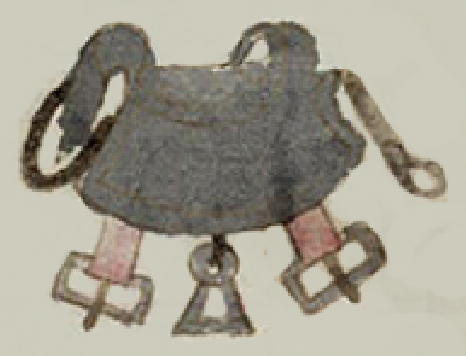silla (CST19)
This painting of the simplex glyph for the term silla (saddle, a loan from Spanish) shows a a profile view of a gray and tan, probably leather saddle with a seat, cantle, and pommel. It has a number of additional accouterments, including what are likely stirrups, billet straps, buckles, and perhaps a whip.
Stephanie Wood
This is a rare glyph, the first one in the collection as of October 2024. For more on the Codex Sierra, see Kevin Terraciano’s study (2021).
Stephanie Wood
1550–1564
Jeff Haskett-Wood
sillas, caballos, piel

silla, saddle for a horse (a loanword from Spanish taken into Nahuatl), https://nahuatl.wired-humanities.org/content/silla
silla
Stephanie Wood
Códice Sierra-Texupan, plate 19, page dated 1558. Origin: Santa Catalina Texupan, Mixteca Alta, State of Oaxaca. Kevin Terraciano has published an outstanding study of this manuscript (Codex Sierra, 2021), and in his book he refers to alphabetic and “pictorial” writing, not hieroglyphic writing. We are still counting some of the imagery from this source as hieroglyphic writing, but we are also including examples of “iconography” where the images verge on European style illustrations or scenes showing activities. We have this iconography category so that such images can be fruitfully compared with hieroglyphs. Hieroglyphic writing was evolving as a result of the influence of European illustrations, and even alphabetic writing impacted it.
https://bidilaf.buap.mx/objeto.xql?id=48281&busqueda=Texupan&action=search
The Biblioteca Digital Lafragua of the Biblioteca Histórica José María Lafragua in Puebla, Mexico, publishes this Códice Sierra-Texupan, 1550–1564 (62pp., 30.7 x 21.8 cm.), referring to it as being in the “Public Domain.” This image is published here under a Creative Commons license, asking that you cite the Biblioteca Digital Lafragua and this Visual Lexicon of Aztec Hieroglyphs.


